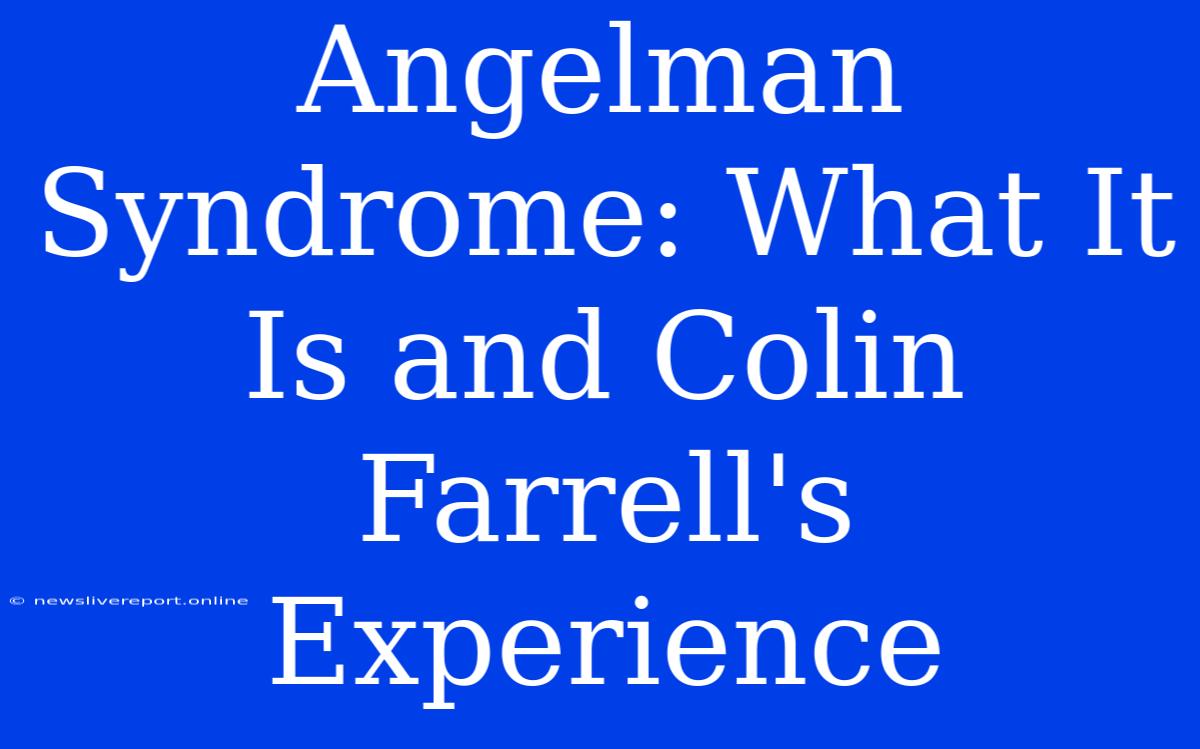Angelman Syndrome: Understanding the Condition and Colin Farrell's Moving Story
Angelman Syndrome (AS) is a rare neurogenetic disorder that affects a child's development, causing a variety of physical and intellectual challenges. While often referred to as a "happy puppet" syndrome due to the characteristic smiling and laughing, the reality is much more complex. Recent attention has been drawn to the condition due to actor Colin Farrell's moving account of his son Henry's journey with AS. Let's delve into the intricacies of Angelman Syndrome and explore what Colin Farrell's experience highlights.
What is Angelman Syndrome?
Angelman Syndrome is caused by a genetic mutation on chromosome 15, specifically affecting the UBE3A gene. This gene is responsible for producing a protein crucial for the development of the nervous system. The mutation can be inherited from a parent or occur spontaneously during pregnancy.
Key Features of Angelman Syndrome:
- Developmental Delays: Children with AS typically experience delays in reaching developmental milestones, such as sitting, walking, and speaking.
- Intellectual Disability: Individuals with AS often have varying degrees of intellectual disability.
- Speech Impairment: Difficulty speaking is common, with many individuals unable to communicate verbally.
- Movement and Balance Issues: Motor skills are often affected, leading to jerky movements, unsteady gait, and difficulties with coordination.
- Characteristic Facial Features: Some individuals with AS may have distinctive features like a wide mouth, protruding tongue, and widely spaced eyes.
- Happy and Excitable Personality: While often described as "happy," many individuals with AS experience frequent laughing and smiling, even when they are distressed.
Colin Farrell's Story: A Father's Love and Advocacy
Colin Farrell's son, Henry, was diagnosed with Angelman Syndrome at the age of six. In recent interviews, Farrell has opened up about his experience, sharing both the challenges and the joys of raising a child with AS. He speaks of Henry's unique personality, his boundless energy, and his ability to bring joy to everyone around him.
Farrell's openness has brought attention to Angelman Syndrome, raising awareness and highlighting the importance of early diagnosis and support. His story serves as a powerful example of a father's unwavering love and dedication to his child.
Living with Angelman Syndrome: Challenges and Hope
While there is no cure for Angelman Syndrome, there are therapies and treatments that can help manage symptoms and improve quality of life. These include:
- Speech and Language Therapy: To improve communication skills.
- Occupational Therapy: To enhance fine motor skills and daily living abilities.
- Physical Therapy: To improve balance, coordination, and movement.
- Behavioral Therapy: To address behavioral challenges and promote adaptive behaviors.
- Medication: To manage seizures and other neurological symptoms.
Families of children with Angelman Syndrome face unique challenges, requiring constant care, support, and advocacy. However, there is a growing sense of hope. Research into potential therapies and treatments is ongoing, and there are active support networks and communities for families.
Moving Forward: A Call for Awareness and Support
Colin Farrell's story underscores the importance of understanding and supporting individuals with Angelman Syndrome. By raising awareness, we can ensure that those with AS receive the necessary care, therapy, and opportunities to thrive. It's a reminder that despite the challenges, there is a world of potential waiting to be unlocked for these individuals.
To learn more about Angelman Syndrome, visit the following resources:
- The Angelman Syndrome Foundation: https://www.angelman.org/
- The Angelman Syndrome UK: https://angelman.org.uk/
- The National Angelman Syndrome Foundation: https://www.angelman.org/
Together, we can make a difference in the lives of individuals with Angelman Syndrome and their families.

